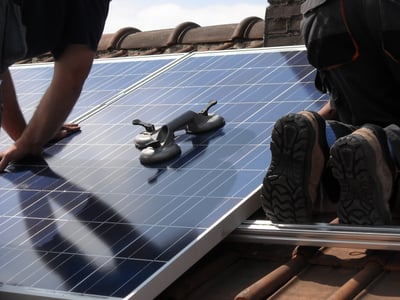Some people want solar energy on their homes because their neighbors have it. Others (like some grandmothers we know) say, “Would you jump off a cliff if everyone else was doing it?” Both are valid perspectives.
If a lot of your neighbors are installing solar electric systems on their homes, it’s likely because they’ve researched the pros and cons and decided solar is a smart decision. There’s absolutely nothing wrong with saving yourself some research time and basing your decision on the simple fact that if so many other people are doing it, it must be a good idea. This happens with many products and services. A product becomes popular and mainstream because it’s tested, tried and true. If it doesn’t deliver what it promises, people stop buying it. If it does deliver, more and more people get on board until it’s a staple in every home.
Nobody asks if they need a home computer anymore. They just ask which one is best for their needs.
 And that’s where the grandmotherly advice comes in. Just because it seems like everyone in California is installing solar, does that mean what they have is best for you? Yes, the overall benefits of solar are accepted by just about everyone these days, especially how easy and safe it is. But, every individual’s situation is different. The value of solar’s benefits and the importance of those benefits are different for every person and every home. Here are things you should consider when deciding if solar is the right decision for you. And check back in two weeks when we’ll post about how to determine if your roof will work for solar.
And that’s where the grandmotherly advice comes in. Just because it seems like everyone in California is installing solar, does that mean what they have is best for you? Yes, the overall benefits of solar are accepted by just about everyone these days, especially how easy and safe it is. But, every individual’s situation is different. The value of solar’s benefits and the importance of those benefits are different for every person and every home. Here are things you should consider when deciding if solar is the right decision for you. And check back in two weeks when we’ll post about how to determine if your roof will work for solar.
(If you find this type of information useful, you might want to download our free Buyers Guide ebook, which addresses more questions like these.)
Your Energy Attitude
Maybe you like buying as much electricity as possible from the utility company because you or a relative work there. After all, every kilowatt-hour you buy at full price from your utility helps them deliver profitable returns to their investors, and many employees are also shareholders. Then again, California is full of independent-minded people who have never been afraid to stand up for themselves and demand something better. So the first thing to ask yourself when deciding if solar is right for you is this: Are you one of them? Do you want to say “no” to high prices?
Does freedom from the never-ending rate increases sound good to you? Do you want to get off the utility treadmill now that it’s in your power to do so? You’re already paying hundreds or even thousands of dollars for electricity a year. Why not shift your existing electricity budget from the utility to solar and save a lot of money in the process? That’s a much smarter use of your money.
Your Electricity Usage
The second consideration when deciding if you and solar are a good match is how much you spend on electricity now. If you have a very low electric bill, it may not be worth the cost to install solar. But if your electric bill is $150 a month or more, solar will most likely save you a lot of money.
Citadel Roofing & Solar customers typically save between 5% and 30% on their electric bills. If you’re paying $150 a month now, you might save $45 a month, reducing your bill to $105. Just think of how $45 a month adds up over the years.
And your lower solar price per kilowatt-hour is locked in for 20 years, with no increases — the sun never raises its rates, as we like to say.
How much you will actually save depends on factors including which panels you choose and how soon you go solar. Our proposal will detail what we estimate you’ll save and why.
Your Available Time
You don’t need a lot of time to go solar, but you do need some. Here’s how it breaks down between you and the company you choose to install your residential solar energy system. A reputable company does most of the work related to your solar installation for you, minimizing your time commitment. This includes getting all town and utility inspections and approvals.

Your time commitment goes something like this:
-
30 minutes for the consultation with one of Citadel’s Solar Consultants to discuss your energy goals and get your questions answered.
-
Up to 1 hour for the visit when we’ll assess your home’s roof and electrical system.
-
4 to12 hours for the installation of the system, although all you have to do is be there. We will tell you upfront about how many hours your installation will take. Most are completed within a day.
Your Tax Liability
The U.S. Government offers a generous 30% tax credit for a residential solar installation purchased with cash or a loan. (Leased systems don’t qualify.) This essentially lops off a third of the upfront price of going solar. Most solar owners are able to take full advantage of the 30% Solar Tax Credit. But a small minority, often retirees with no income, don’t owe enough in taxes to benefit from the full tax credit. However, the credit can be spread over a few years, so most people do enjoy the thousands of dollars this incentive delivers.
Important note on the Solar Tax Credit: be aware that the 30% only applies through the end of 2019. In less than a year, the tax credit drops in value and eventually it disappears. Learn more in our post, Uncle Sam Wants You to Go Solar.
Your Environmental Ethic
Many people choose to make their own clean energy with solar merely for the savings. That’s OK. In our book, the more solar, the more benefit to the planet, no matter what motivates you. But if you are concerned about climate change and want to be part of the solution, solar is a no-brainer. It pays for itself, and saves you money from the start, so why wouldn’t you install a little noise-free, emissions-free “power plant” of your own on your home?
Solar is a renewable and incredibly powerful natural resource. It’s environmental contribution is also incredibly powerful. For example, if you install a 5,000-watt solar energy system, it should offset over 25 years 298,109 pounds of carbon dioxide, the leading greenhouse gas; 840 pounds of sulfur dioxide, which causes acid rain; and 57 pounds of particulates that cause asthma.
And that is something worth bragging about to your friends.
How Long You'll Be In Your Home
If you think you might sell your residence in the next few years, that’s all the more reason to go solar now. Yes, you read that right. Of course solar makes sense if you will be in your home to enjoy all that low-cost and eventually free electricity over the years. But it also makes sense if you’re planning to sell, because solar is proven to increase the re-sale value of your home, and to decrease the sale time.
You’ve probably heard the old maxim that every dollar you invest in your home delivers two dollars in re-sale value? It’s similar to that. And, it’s backed up by numerous studies.
This study by the U.S. Department of Energy’s Lawrence Berkeley National Lab details how solar increases property values. For a typical residential system of 8,000 watts, the increase in value is $28,000 - $32,000. (Click here for the full report.)
And, homes with solar typically sell faster, according to the Appraisal Institute.
It makes sense. Who wouldn’t want to buy a house with no electric bill? (Just be aware that these benefits apply when the solar energy system is owned by you. Leased systems actually have the opposite effect, making home sales more difficult.) Careful consideration of the factors explained above will help you make an informed decision about whether or not to go solar, based on your attitudes and lifestyle.
Visit our blog again in two weeks when we’ll dig into How to Tell if Solar Works for Your Roof.



